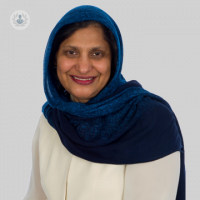Understanding preventive mastectomy: Risks, benefits, and recovery
Written by:In the realm of proactive health decisions, preventive mastectomy has emerged as a powerful tool for individuals at high risk of breast cancer. In her latest online article, Professor Amtul Razzaq Carmichael delves into the various aspects of preventive mastectomy, exploring what is risk reducing mastectomy, who is likely to benefit from this operation, surgical and reconstruction options, recovery process and its, risks and benefits. Bilateral risk reducing mastectomy is an empowering choice for women, but we must not underestimate its emotional and psychological impact.

What is risk reducing mastectomy?
Risk-reducing mastectomy, also known as prophylactic mastectomy, is a surgical procedure aimed at reducing the risk of breast cancer. Typically recommended for individuals with a high risk due to genetic factors, family history, or a previous cancer diagnosis, this intervention involves the removal of one or both breasts to significantly decrease the likelihood of cancer development.
Who is considered a candidate for risk-reducing mastectomy?
Candidates for preventive mastectomy are often those with a heightened risk profile. This includes individuals with a family history of breast cancer, carriers of certain genetic mutations (such as BRCA1 or BRCA2), or those who have previously battled breast cancer. Genetic testing plays a crucial role in identifying individuals who may benefit from this proactive approach.
Risks and benefits of preventive mastectomy:
Risks:
- Surgical complications, including infection and bleeding.
- Potential impact on body image and self-esteem.
- Long-term physical effects, such as changes in sensation.
Benefits:
- Up to 90% reduction in the risk of developing breast cancer.
- Enhanced peace of mind and reduced anxiety.
- Improved chances of early detection if cancer does occur.
Different types of preventive mastectomy:
There are several surgical options available for preventive mastectomy, each with its own considerations. Total mastectomy involves the removal of the entire breast, while subcutaneous mastectomy removes breast tissue, leaving the skin intact. Nipple-sparing mastectomy preserves the nipple and areola, providing a more aesthetically pleasing result. It is best to discuss your options with your surgeon and make a choice based on your risk profile and personal preferences.
Recovery process for risk-reducing mastectomy:
The recovery process of the risk reducing mastectomy depends upon the type of surgery and reconstruction undertaken. Most people are independent and self-caring immediately after surgery but would require some support for up to two weeks. Most people make a full recovery between 6 to 12 weeks after. Patients will require some basic painkillers. The surgical team keep a close eye making sure to handle any complications if they develop.
Emotional and psychological considerations:
The decision to undergo risk-reducing mastectomy is not solely a physical one; it impacts women both emotionally and psychologically. Emotional support from healthcare professionals, family, and friends is vital during this journey. Resources such as counselling and support groups can provide valuable assistance in navigating the emotional aspects of this decision.
Professor Amtul Razzaq Carmichael is a distinguished oncoplastic breast surgeon with over 30 years of experience. You can schedule an appointment with Professor Carmichael on her Top Doctors profile.


